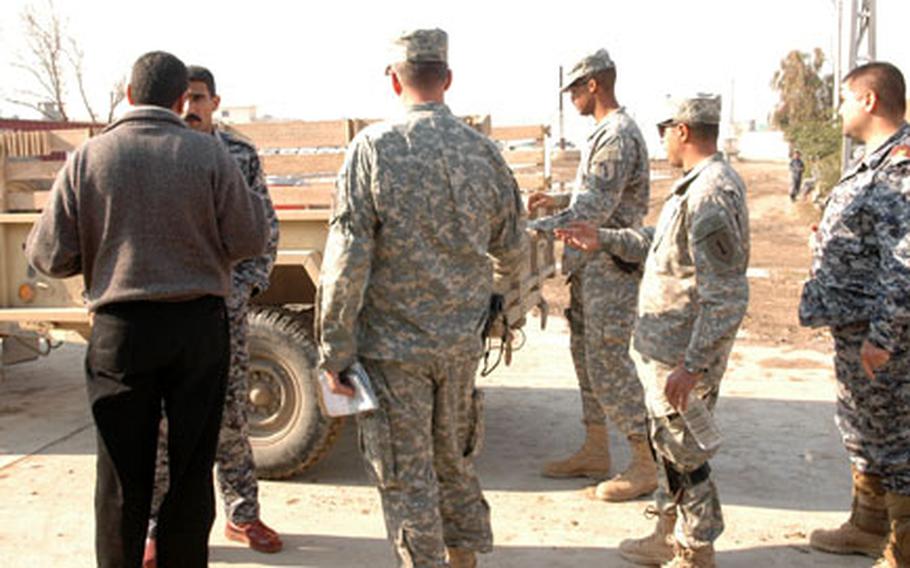
Members of the U.S. military’s National Police Transition Team for the 8th Brigade, 2nd National Police, unload two new computers they bought in January for the police brigade headquarters. (Lisa Burgess / Stars and Stripes)
BAGHDAD — Accused by some of ties to militias; hailed by others as the key to the security of the country; often outgunned, underpaid and overwhelmed by political forces beyond their control, few groups are as controversial in Iraq as the National Police.
“There are a lot of eyes on the National Police right now,” Lt. Col. Jonathan Sistare, National Police Transition Team chief for the 8th Brigade, 2nd National Police said.
Sistare, an Army Reserve officer who in his civilian life is town manager of Jaffrey, N.H., is particularly aware of the increased scrutiny.
He leads what the U.S. military calls the “8-2 NPTT,” the small handful of soldiers and civilians who train and mentor the Iraqi unit.
The 8-2 is the only Iraqi police brigade to have been suspended, wholesale, by the Iraqi Ministry of the Interior, which pulled the entire 700-man unit offline Oct. 4.
Now they are back, vetted, retrained, with new leadership. And it’s up to the NPTT to help the 8th Brigade as it wipes the slate clean and shows Baghdad a new side.
The brigade’s suspension followed the mass kidnapping of 24 Sunni workers in a frozen food factory in the southwestern Baghdad neighborhood of Amil, which the 8th Brigade was responsible for patrolling.
Sunnis in Iraq’s government accused the Shiite-dominated brigade of turning a blind eye to sectarian crimes.
But rather than eliminate the 8th Brigade permanently, Iraq’s government chose new leadership, including a new commander, Brig. Gen. Ali Ibraheem Dab’oon.
They also sent the brigade’s rank-and-file back to school for retraining, at Iraq’s advanced police academy at Numaniyah.
To help build a working relationship with the brigade, the NPTT went along to Numaniyah for the three-week training session, which began Nov. 15.
“We were with them pretty much 24-7,” Maj. Joe West, 36, from Oklahoma City, said.
The curriculum included police skills, such as investigations, interrogations, rules of law and protection of human rights.
But just as valuable, if not more, West said, was the time the Iraqis spent with their mentors.
“We were very conscious that they were looking to us as role models,” West said.
The 1st and 2nd battalions of the 8th Brigade, each of which has 500 police, finished training on Dec. 14, took leave and began operations in early January.
The 3rd Battalion is still at Numaniyah, Sistare said.
Along with new commanders, the 8th Brigade was reassigned by the Interior Ministry to patrol a new sector in Baghdad’s east side, so it could start fresh with the population, Sistare said.
Each NPTT commander has a small monthly stipend — $2,500 — to use as he sees fit to help police improve operations. In January, Sistare’s team used its $2,500 to purchase two computers for the general’s headquarters.
In February, the money already is earmarked for local contractors to do carpentry and plumbing repairs to the barracks.
NPTTs also help their police units plan different kinds of operations, and often, go along on the actual missions.
In early January, the team accompanied Ali during a nighttime visit to six of his checkpoints, spread far and wide around East Baghdad.
The team followed the general as he rode through the twisted, trash-strewn streets in his personal vehicle, accompanied by a few truckloads of police.
At each checkpoint, Ali checked weapons, patted backs and offered words of encouragement. At the end of the evening, Sistare said he was pleased by what he had observed: at each checkpoint, the Iraqi police had been awake, in uniform, armed and ready.
“He’s very caring of his ‘shurta,’” Sistare said, using the Iraqi word for police.
“He checks to make sure they have their needs met, and that they’re getting fed.”
“He has the very strong loyalty of his officers and ‘shurta,’” Sistare said. “That’s really needed for the police right now.”